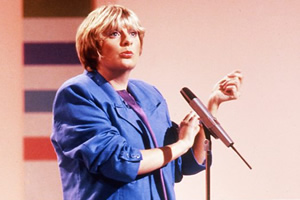
Victoria Wood (I)
- English
- Actor, writer, composer and stand-up comedian
Press clippings Page 16
They're now more classic than cutting edge, but it's good to have Harry Enfield and Paul Whitehouse back for a fourth series of their sketch show. Tonight they revisit old ground (their spoof of Dragons' Den) and break out some new characters. Victoria Wood joins in for a dig at the minor royals, and there is a send-up of Question Time.
Toby Dantzic, The Telegraph, 26th October 2012Isy Suttie: 'I'd love to work with Victoria Wood'
She's a trained musician and wanted to be a singer. But when people laughed at her silly, twisted songs, Isy Suttie took up comedy. Brian Logan talks to the Peep Show star about her brutal new show.
Brian Logan, The Guardian, 3rd June 2012Craig Hill talks about his comedy hero Victoria Wood
'It's all about delivery, tight writing and use of language.'
Brian Donaldson, The List, 28th February 2012The newest thing in comedy sketch shows - and doesn't that very phrase feel antediluvian? - is Watson & Oliver, well known to Edinburgh Fringe audiences. They're an appealing duo. Ingrid Oliver has a thrillingly low voice - Fiona Bruce meets Victoria Coren - she's a dead ringer for Myleene Klass (who is duly ridiculed), and she can really act. Lorna Watson is blond, brittle and has to work harder for laughs. Their opening gambit was a direly old-fashioned bit of sub-Morecambe & Wise before-the-show backchat, but, once they settled down, their sketches were inventive and unusual. In a spoof of a TV Jane Austen serial, the mob-capped duo tittered like six-year-olds about pin cushions to a pair of bored Mr Darcys, then switched abruptly to double entendre. ("Our dance cards - we eagerly await the filling of our slots by two special gentlemen.") A Victoria Wood-style pastiche of 1950s ladies' kitchen conversation - all pinnies and hair-rollers - was surreally punctuated by Watson's response-appropriate eyebrows. A greasy-spoon café became a symphony of shouts and orders in which everyone called everyone else "darling" - "Cup o'tea, darlin'?" "Keep the change, my darlin'" - until someone silenced the room by saying "Love". In what is clearly meant to be the show's signature sketch, the girls do their impression of Prince William and Kate tucked up in bed, unable to find anything to talk about except their wedding day. But couldn't they have found a better punchline subject than Pippa Middleton's over-prodded rump?
The best sketch imagined two Playboy bunnies squeaking competitively about how pink their living quarters were, how appealing their fake boobs, how delightful their lives, until they were summoned to cuddle up to the saurian Hefner. Between retchings, they competed as to which had a better excuse not to fulfil this noisome duty. It was a gift of a subject to these two funny, appealing women, and they seized it with unladylike glee. I look forward to seeing a lot more of them.
John Walsh, The Independent, 26th February 2012BBC screens Joyce Hatto biopic penned by Victoria Wood
British pianist had dozens of recordings by other artists passed off as her own by husband William Barrington-Coupe.
Jason Deans, The Guardian, 20th February 2012There aren't enough female comics on TV
This is a critical year for BBC comedy, when it will finally seek to address previous failings in giving a television platform to the funniest women in Britain. The track record is poor. It's now 35 years since Victoria Wood made her breakthrough on That's Life.
Ian Burrell, The Independent, 13th February 2012Video: Billy Connolly voted most influential UK comic
Billy Connolly has been voted the most influential British comedian of all time.
The Big Yin beat the likes of Morecambe and Wise, Les Dawson and Victoria Wood to top the poll.
It was voted for by the public and comedians.
It puts Billy Connolly on a par with his friend Robin Williams, who was named most internationally influential comedian.
BBC News, 31st January 2012Victoria Wood and Stephen Fry star in The Borrowers
Victoria Wood and Stephen Fry are among the stars bringing The Borrowers delightfully back to life - this time with added gizmos.
Dominic Cavandish, The Telegraph, 20th December 2011Victoria Wood gets lifetime achievement award
Victoria Wood and Emily Watson honoured as outstanding women in the film and TV industry.
The Telegraph, 2nd December 2011Peep Show, Cabin Pressure, Victoria Wood win writing awards
The writers of Peep Show, and Radio 4 sitcom Cabin Pressure, and Victoria Wood were amongst the winners at the 2011 Writers' Guild Of Great Britain Awards.
British Comedy Guide, 16th November 2011